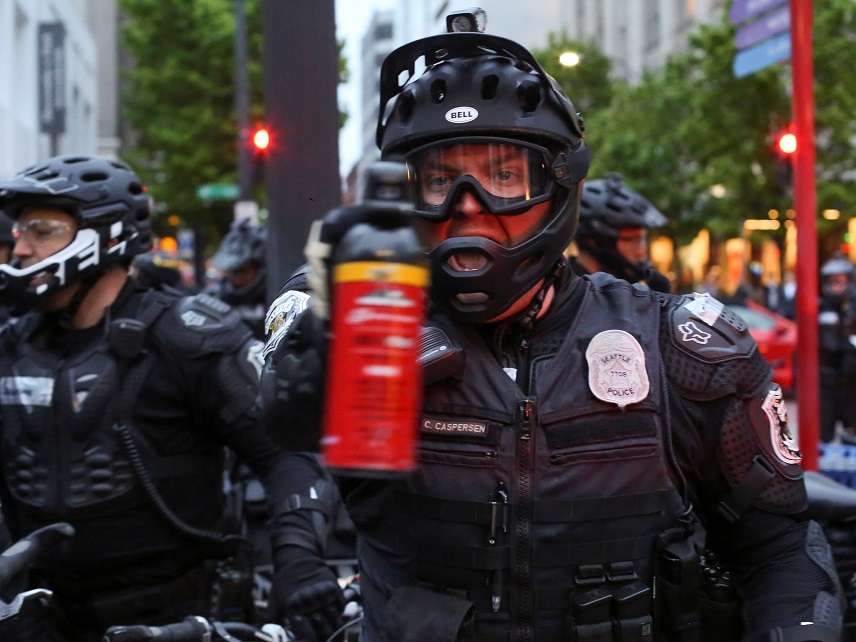Washingtonians to Vote on Making It Easier to Convict Cops for Using Deadly Force
The measure would also require officers to render first aid directly after shootings and undergo new training.

Voters in the Evergreen State will get to decide on a ballot measure dealing with police use of force and training in November after the Washington secretary of State's office accepted enough of the nearly 360,000 signatures filed for the ballot measure to qualify.
It's particularly difficult to prosecute and convict police officers in Washington State. Data collected by the National Police Misconduct Reporting Project (NPMRP) showed the state had the lowest prosecution rate for cops accused of misconduct of all 50 states. It also had the second lowest conviction rate in the country for such cops, as NPMRP founder David Packman pointed out in 2011 while discussing what made the nationwide problem of lack of accountability "significantly pronounced" in Washington.
Initiative 940 (I-940), led by the De-Escalate Washington campaign, would change the law surrounding justifiable use of deadly force, requiring police officers to meet a "good faith" standard in order to be protected from criminal liability. Currently, prosecutors must prove police officers acted with malice to overcome their immunity, which makes convictions exceedingly difficult.
I-940 would also require police officers to undergo violence de-escalation training and mental health training (to help in dealing with others' mental health issues, not their own). The classes would be formulated by the state Criminal Justice Training Commission in consultation with law enforcement agencies and "community stakeholders."
Finally, the measure would require officers to be trained on how to administer first aid to victims harmed in encounters with police, and would require policies establishing a "duty to preserve the life of persons whom the officer comes into direct contact with while carrying out official duties, including providing or facilitating immediate first aid to those in agency care or custody at the earliest opportunity."
A statewide task force recommended in 2016 that the "malice" standard should be removed from the law, but legislators failed to act.
They could still pass I-940 before the November vote. More than 30 state legislators have endorsed the initiative, according to The Stranger. But organizers are not optimistic that it won't still come down to the ballot initiative.
"We have hopes, but we're not betting on it," Andre Taylor, who sits on the leadership team of De-Escalate Washington and is the brother of police shooting victim Che Taylor, told The Stranger.
Two politically influential labor groups, the King County and Washington State labor councils, have endorsed the initiative.
Not surprisingly, the Washington Council of Police & Sheriffs (WACOPS) and other police unions are opposing the effort, as they did in 2016. The unions complained in a letter last month that the "true purpose" of I-940 was to "make it easier to prosecute officers."
The whole situation could have been avoided. Ideally, police departments should have the kind of rules in place that make it possible for leadership to discipline and remove problem officers before they kill, and the kind of leadership in place willing to use the ability. Too often, however, police unions have helped negotiate contracts that make preventive measures difficult to accomplish, leaving cops with little accountability until they do something so egregious they find themselves facing a criminal trial.
If police unions and advocates want it to continue to be difficult to convict police officers, they need to make it easier to fire those who cause problems. Insisting that a good faith standard is unacceptable both in court and when it comes to a cop's employment status only increases the pressure to weakon the immunities from criminal liability that police currently enjoy.


Show Comments (47)